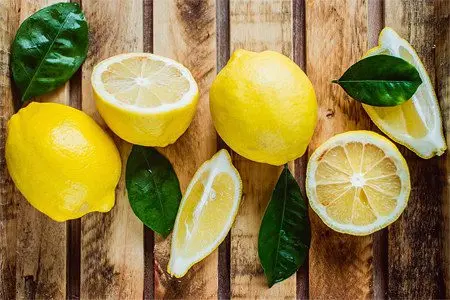Contents

This low evergreen tree belongs to the rue family and, of course, to the citrus family. Lemon leaves are not long, are on short petioles. The root system of a lemon differs from other citrus fruits: it consists of a “web” of root offspring, thanks to which this plant receives all the nutrients and water from the ground. White lemon flowers are very large and have a very pleasant aroma. There are varieties of lemon that bloom all year round.
The lemon is native to Southeast Asia. A fruit with amazing properties is known throughout the world. Its beneficial qualities have been used by people for many centuries. Today, this fragrant fruit is a component of cosmetics and perfumes. Tea with lemon helps to get rid of nausea, tones up the work of the gastrointestinal tract.
The peel of fruits and leaves of this evergreen plant is a source of essential oil, which contains citral, alpha-limonene and terpene. The aroma of lemon oil relieves mental and physical stress and fatigue. Daily addition of pieces of pulp or juice to water strengthens the immune system and helps protect against seasonal colds.
The chemical composition and calorie content of lemon
Calories 47 KKal
- Fats:
0,3 g
- Proteins:
1,1 g
- Carbohydrates:
9,3 g
- Water:
89 g
- Ash:
0,3 g
Lemon is rich in vitamin C – 53 mg in the pulp (59% of the RDI), and 129,0 mg in the peel with zest (143% of the RDI). And also boron – 175,0 mcg (250% of the RDA)
Full chemical composition of lemon ➤
All parts of plants contain unique active substances. They are complex biochemical compounds that have a pronounced positive effect on a person’s well-being. Of particular importance are the active substances contained in citrus fruits.
Studies have shown that lemons contain compounds that can prevent cardiovascular diseases, alleviate the symptoms of inflammation, and have a beneficial effect on the well-being of cancer patients. [1], [2], [3].
Of the specific compounds contained in lemons, it is worth dwelling on the following:
Lemon acid. An organic acid most characteristic of lemons. It is a natural remedy for preventing the formation of kidney stones.
Diosmin. An antioxidant that is added to drugs prescribed to normalize blood circulation. Diosmin has an anti-inflammatory effect, normalizes the tone of skeletal muscles [4].
Hesperidin. A powerful antioxidant that improves the elasticity of the vascular wall, preventing atherosclerosis, which develops due to the formation of fatty plaques inside the lumen of the arteries [5].
Eriocitrin. Specific antioxidant found in lemon juice and zest [6].
D-limonene. A substance concentrated in large quantities in the lemon peel. D-limonene is concentrated in lemon essential oils and gives them a special aroma. This biochemical compound helps to cope with gastric reflux, alleviate heartburn [7].
To get the maximum benefit, experts recommend consuming whole lemons, after peeling the peel. The fact is that in lemon juice the concentration of valuable substances is lower than in fresh pulp.
Useful properties of lemon
Lemon contains many substances useful to a person, and therefore it is used for many diseases. One of the uses of lemon is to use its vitamin properties that help with scurvy. Lemon is an excellent prophylactic. It is used for beriberi, atherosclerosis. Lemon contains a lot of citric acid, water and a whole range of useful vitamins. Lemon has a hemostatic property, so it is used for bleeding from the nose, stomach, and even bleeding from the gums. Lemon is used as an antipyretic and tonic for tuberculosis, pneumonia, Botkin’s disease and other infectious diseases.
The juice or pulp of this fruit has a remarkable thirst-quenching effect. It exhibits bactericidal properties, promotes the activation of leukocytes in the body’s defense system. Rutin and bioflavin, contained in lemon, heal blood vessels, making them elastic, eliminating fragility and excessive penetrating power.

7 Health Benefits of Lemon Proven by Science
1 Lemons heal the heart

Lemons are traditionally considered one of the best sources of vitamin C. One medium-sized lemon has almost 31 mg of ascorbic acid. This volume corresponds to 51% of the total recommended dose of vitamin C per day. Clinical evidence suggests that additional servings of fruits and vegetables high in vitamin C help reduce the risk of strokes and other heart diseases. [8].
However, vitamin C is not the only substance in lemon that is good for the heart. Phyto compounds and citric fiber have an overwhelming effect on the factors that provoke heart disease.
One of the experiments devoted to the study of the properties of lemon lasted 30 days. The results showed that taking 24 grams of lemon fiber extract daily helped lower total blood cholesterol. [9].
It turned out that hesperidin and diosmin, which are specific substances for lemon, have a normalizing effect on the blood lipid profile. [10], [11].
2 Lemons help maintain normal weight

Currently, there are several opinions regarding the effect of lemons on the mechanism of weight loss.
A number of experts believe that lemon pectin fibers affect weight control. These soluble fiber fibers increase in volume when they enter the stomach, which allows you to maintain a feeling of satiety for a long time.
Not everyone can eat a whole lemon. Most often, juice is consumed in which pectin is absent, which means that this does not affect the feeling of fullness in any way. There is an opinion that regular use of hot lemon water helps to get rid of extra pounds. It is important to consider here that pure water is able to independently stimulate the process of burning a certain amount of calories, and lemon does not act as some kind of catalyst here.
Numerous studies have shown that the phytonutrients in lemon have an active effect on body fat. Mechanisms for the implementation of the fat-burning effect are implemented in several ways. One of them is preventive, the other is a method of direct suppression of weight gain. [12], [13].
Under laboratory conditions, the conditions for fattening were created for mice. Some of them, on the background of a plentiful diet, received polyphenols obtained from lemon peel. The final analysis showed that in the experimental sample, weight gain and body fat were much less than in the control group. [14].
3 Lemon prevents the formation of stones in the kidneys

Calculi, they are stones, are dense crystalline formations in the kidneys. They are formed from acid residues of waste products. Kidney stone disease is a fairly common disease, which is characterized by a tendency to relapse, re-formation of stones. Lemons contain citric acid, which prevents the crystallization of salts and the formation of stones. A specific substance stimulates the formation of urine, increasing its pH. These factors create unfavorable conditions for the formation of stones in the kidney structures.
Studies show that taking as little as 125 ml of lemon juice daily appears to protect against the recurrence of kidney stones in patients who have previously sought medical attention for nephrolithiasis. [15], [16].
These data confirmed the results of other experiments. Most scientists believe that regular consumption of lemons protects the kidneys from stones formed from different types of salts (urates, oxalates, phosphates, carbonates) [17], [18].
4 Anemia prevention

Iron deficiency anemia is the most common type of hematological syndrome that develops on the background of a diet with insufficient amounts of iron-containing foods.
Some iron has been found in lemons, but other active ingredients greatly enhance the absorption of iron from plant-based foods. [19], [20].
In the intestines, heme iron is absorbed, which enters the body along with poultry and animal meat, fish. Plant (non-heme) iron is absorbed slowly and in small amounts. Vitamin C and citric acid, which are found in excess in lemons, helps to improve this process. Studies show that regular consumption of lemons helps absorb the maximum amount of iron from food.
5 Has antitumor properties

A healthy diet, with plenty of vegetables and fruits, is highly protective against the development of certain types of cancer. The results of clinical studies suggest that the systematic use of large portions of citrus fruits, including lemon, reduces the risk of cancer. [21].
A number of scientists are of the opinion that substances found in different parts of the lemon have antitumor properties. These biochemical compounds include limonene and naringenin. [22], [23], [24].
Preliminary animal data confirm that lemon oil contains D-limonene, a substance with a proven anti-cancer effect. [25], [26].
The pulp of tangerines contains beta-cryptoxanthin and hesperidin, which are also found in lemons. Scientists were able to obtain evidence that these plant compounds block the development of oncological foci in the lung tissue, large intestine and tongue of laboratory rats. [27].
6 Lemons improve digestion

The share of carbohydrates in the composition of lemons accounts for approximately 10%, of which the bulk are soluble fiber fibers, simple sugars. Of the fibers, pectin, which has a lot of positive effects, should be isolated separately.
Soluble fibers have a healthy effect on the intestines, slowing down the absorption of starches and various types of sugar. [28].
It is important to remember that plant fibers enter the body along with the pulp of a lemon. Lemon juice is completely absent of fiber, so it does not have a pronounced effect on digestion.
7 Relieve cramps
Convulsive contractions of the muscles can be felt both in the legs and in the arms. Quite often, pregnant women complain of cramps. The results of some experiments suggest that the external use of lemon has a beneficial effect on muscle fibers, helps to reduce the frequency of attacks and the intensity of contractions. To obtain the desired effect, it is enough to cut a lemon and treat the plantar area of the legs or palms and leave until the juice dries completely on the skin.
The use of lemon

Lemon is a natural source of such vitamins as C, P, B1 and B2, D. Lemon is an antioxidant of natural origin, it excites the whole body, and thanks to essential oils it protects it from stress.
It stimulates cardiac activity, treats the central nervous system, helps with hypotension and neurasthenia. Lemon syrup has an antihelminthic effect. Outwardly, a solution of juice with water is used when rinsing the mouth with inflammatory processes. Lemon juice is also used for eczema and fungal diseases in the form of lotions.
Lemon juice can heal cracks in the skin, reduce brittle nails. Lemon zest with honey helps to improve digestion. Lemon is recommended for pregnant women and people diagnosed with jaundice.
Lemon is used in folk medicine as an additional remedy for liver diseases, edema, rheumatism, gout and gastritis with low acidity.
Water with lemon

The benefits of water with lemon have long been proven in practice, with regular use, it relieves headaches, lowers blood pressure, and makes the treatment of kidney diseases effective.
Water with lemon helps to remove toxins from the body, which favorably affects the general condition and appearance.
Water with lemon on an empty stomach especially useful: it activates the digestive tract.
Water with honey and lemon It is considered a fortified drink that saturates the body with vitamin C and trace elements. 100 g of lemon contains 40 mg of vitamin C, a cup of water with lemon juice eliminates sore throats.
Gargling with a mixture of the juice of half a lemon, a teaspoon of coarse salt and a glass of water helps with sore throats. The use of lemon as a food product will help normalize the functioning of the nervous system, relieve fatigue, general weakness.
With varicose veins, hemorrhoids, trophic ulcers, lemon is also indicated. It is also an effective tool in the fight against various viruses, capable of destroying up to 20 varieties of microbes, its substances are effective in dysentery, paratyphoid, cholera, meningococcus, scurvy, jaundice, dropsy. Lemon is prescribed for nephrolithiasis, pulmonary tuberculosis, catarrh of the stomach, gout, lumbago.
This fruit is suitable for people of any age and is an excellent remedy for putrefactive processes.
[Video] Dr. Berg – Why does everyone need lemon water? And it’s not about vitamin C:









